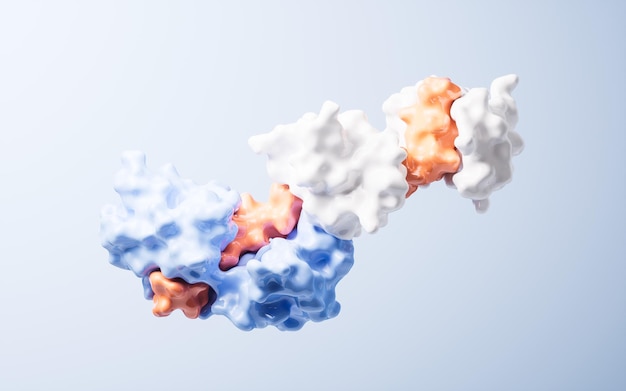How Do Proteases Work?
Proteases function by breaking down a protein’s bonds through a chemical process known as hydrolysis. This process converts proteins into smaller chains called polypeptides and even smaller units called amino acids. Proteins have complex folded structures and need protease enzymes to break down the molecules in specific ways. Without proteases, the intestinal lining wouldn’t be able to digest proteins, leading to serious health problems.
What Do Proteases Do?
Proteases are crucial for many physiological processes, including DNA replication and transcription, cell maintenance and repair, immune function, and blood clotting. Essentially, they are involved in breaking down proteins, which is vital for numerous critical body functions.
Where Do Proteases Come From?
Proteases such as trypsin and chymotrypsin are mainly produced by the pancreas. Additionally, they are found in fruits like papaya (papain) and pineapple (bromelain). Bacteria and other microbes also produce proteases. Sometimes, pathogenic bacteria produce proteolytic enzymes that mimic human proteases, which can negatively impact health. An imbalance in the body’s production of proteases may lead to cardiovascular, metabolic, and immune system issues.
The Health Benefits of Protease Enzymes
Proteolytic enzymes offer numerous health benefits, with digestion being the most immediate one. These enzymes are vital for digesting food and also help break down unwanted harmful organisms, waste products, toxins, cellular debris, and undigested proteins in the body. By breaking down proteins, proteases provide cells with the amino acids they need to function properly. Enzymes play a significant role in overall health, especially in digestion. Modern science and medicine are now studying proteolytic enzymes for their potential clinical and therapeutic uses in oncology and immune function.
Supports Gut Health
A 2010 U.S. study on inflammatory bowel diseases discovered that the proteolytic enzyme bromelain, found in fresh pineapple juice, could help alleviate chronic conditions in the colon. Research suggests that bromelain counteracts intestinal pathogens like Vibrio cholera and Escherichia coli, although the exact mechanism is still unclear. It may prevent bacteria from sticking to the intestinal walls or interact with the body’s secretion signaling to help manage diarrhea.
Soothes Skin Burns and Stomach Ulcers
A 2010 study published in the Burns journal from Brazil found that protease supported the cellular repair of third-degree skin burns and stomach ulcers in laboratory mice. The study focused on a protease from mountain papaya.
Helps the Body Recover From Bruises, Fractures, and Tissue Injuries
Clinical trials have shown that protease enzymes can accelerate the healing of sprains, bruises, fractures, and tissue injuries. Some natural healthcare providers use a bromelain cream to increase blood flow to wounds. Bromelain also reduced bruising and swelling from episiotomy scars after childbirth in women.
Slows or Stops Irritation
Protease enzymes naturally respond to irritation in the body, especially those related to allergies, harmful organisms, intestinal issues, and tissue health restoration after blood flow disruption. Intriguingly, invasive bacteria also emit proteases that mimic our own, forcing our bodies to counteract through complex physiological reactions. Some research indicates that the bromelain enzyme, from pineapples, may reduce internal irritation.
Eases Bone and Joint Discomfort
Preliminary studies suggest that proteolytic enzymes can help alleviate the symptoms of osteoarthritis. Research has found that enzyme therapy, including bromelain and trypsin, is as effective and better tolerated than non-steroidal anti-inflammatory drugs (NSAIDs) like diclofenac.
Assists Recovery From Sprains and Sports-Related Injuries
Research suggests that protease enzyme combinations can aid in recovering from sports injuries. A small German study involving 44 people with sports-related ankle injuries found that those given bromelain recovered faster and needed less time away from training. Another recent study found that enzyme therapy reduced exhaustion and sped up muscle recovery after intense exercise.
Digests Proliferating Cells
The digestive enzyme bromelain was shown to reduce the growth of cells that were proliferating excessively in both mouse and human cells. It helped regulate the expression of proteins that enhance the immune system’s ability to fight serious health issues.
Helps the Circulatory and Lymph Systems
Protease enzymes help cleanse debris from the circulatory and lymphatic systems. In patients with unhealthy lifestyle habits, using bromelain along with medication improved the medication’s effectiveness by 121%. Research on both animals and humans has shown that this enzyme improves circulation and reduces risk factors associated with cardiovascular events.
Helps Blood Clot Normally
Certain proteases can improve blood cell quality, enhancing circulatory response. Bromelain has anticoagulant properties, potentially reducing the risk of blood clots.
May Have Antioxidant Properties
Some proteases exhibit antioxidant properties. Studies investigating the safety of papain from unripe papaya latex for wound healing found it to be safe and effective, with added antioxidant benefits.
How to Read the Units of Measurement for Protease
Most dietary enzyme supplements contain between 30,000 and 60,000 HUT of protease. HUT stands for Hemoglobin Units on Tyrosine Basis, which measures how effectively enzymes break down proteins into smaller polypeptides and amino acids. HUTs indicate the enzyme’s activity level, based on a 30-minute hydrolysis of a hemoglobin protein molecule at pH 4.7 and 40 degrees Celsius. Avoid enzyme supplements labeled solely by weight (e.g., milligrams) as this doesn’t reflect enzyme effectiveness. The United States Pharmacopeia (USP) sets the standards for supplements, published in the USP’s Foods Chemical Codex (FCC), an internationally accepted compendium for food ingredient quality.
Where Can I Find The Best Source of Supplementary Protease?
VeganZyme contains a 100% vegan form of protease derived from vegetarian, non-GMO sources. It is kosher certified, gluten-free, made in the USA from globally sourced ingredients, contains no animal products, and is ideal for vegetarians and vegans. VeganZyme is the most advanced full-spectrum systemic and digestive enzyme formula available, free from fillers and toxic compounds. It includes protease and other digestive enzymes that help break down proteins, fats, sugars, carbohydrates, gluten, fruits and vegetables, cereals, legumes, bran, nuts, seeds, soy, dairy, and other food sources. Additionally, VeganZyme provides a comprehensive blend of systemic enzymes to break down excess mucus, fibrin, toxins, and environmental irritants.

